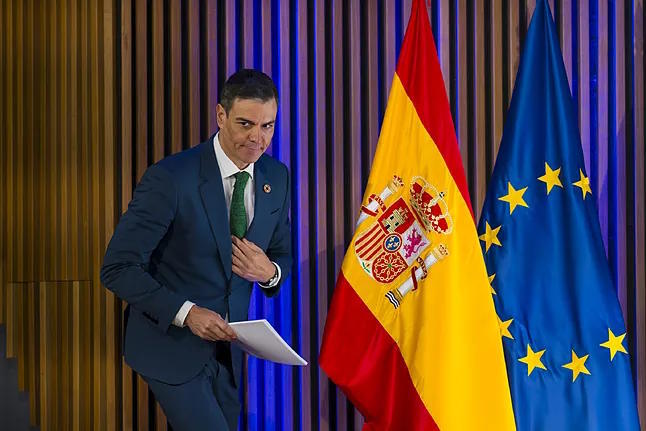The President of the Government of Spain, Pedro Sánchez, dedicated a few words yesterday to the representatives of Spain abroad. The head of the Government attended the ambassadors' conference to convey, in a speech of over 40 minutes, the guidelines that should mark Spain's geostrategic position in the world. The meeting took place a week before Donald Trump's inauguration as president, and although he acknowledged that "the United States is an essential ally to face the challenges of our times and also for the defense of our coexistence model," he also outlined an ideology completely different from Trump's. He did not directly refer to the Republican at any time, but he did speak of the "reactionary international," the term he uses to refer to the axis of international far-right parties that includes Trump, the Argentine Javier Milei, and the Hungarian Viktor Orban.
In addition to the "reactionary international," Sánchez included in a talk aimed at Spain's representatives abroad some of the arguments typical of a Socialist Party rally. He brought his party's program to foreign policy. Thus, he told the diplomats that Spain's "letter of representation" is that "the last dictatorship in Western Europe became a reference for freedoms," referring to the 50 years since Franco's death, the main focus of this year of Government.
He told the ambassadors that "Spain has credentials to make itself heard: an absolutely extraordinary economic moment, we inspire and deserve trust like never before." He also urged diplomats to join the deployment of "an ambitious and effective foreign policy, based on openness and increasing the number of partners and allies that Spain can have, and in defense of effective multilateralism and peace." A multilateralism that contrasts with Trump's preference for bilateral relations.
Faced with a new Trump era where protectionism seems to prevail once again in the country, Sánchez stated yesterday that there are only two positions: "Either we let ourselves be dragged by the inertia of letting the multilateral order languish and erode, or we courageously defend the order in which we believe. It is when we must stand up for our values with more determination," another example of his political stance far from Trump's dogmas.
In the afternoon, King Felipe coincided with this idea of multilateralism defended by Sánchez in the morning at the closing of the ambassadors' conference. "Multilateralism, so questioned in our days, is the best safeguard to avoid stumbling on the same stones of history; to defend a world defined by law, not by the law of the strongest. A world aware of fractures and inequalities, and that only dialogue and cooperation can prevent them from turning into conflicts," said the Monarch.
The King also recalled that "democracy is not only the conquest of a historical occasion, but the result of demanding and delicate daily work" and mentioned a series of responsibilities and commitments that concern everyone and that Pedro Sánchez did not address in the morning: "respect for its values and balances such as tolerance, pluralism, separation of powers, transparency, and accountability," Felipe VI enumerated.
Spain is now, as Pedro Sánchez boasted in the morning, "one of the great defenders of the European Union and therefore of the wounded bull of that weekly that said It's pain on the cover of The Economist just over a decade ago, we have gone from being a Spanish 'pata negra' that is valued worldwide."
So he asked the ambassadors to speak "proudly of our economic and social model's success without any complexes or hesitation, not to praise the economic policy that made it possible, but to highlight the best we have, which is the talent of our companies and of course many workers."
"I want you to be filled with pride when you talk about the great transformation that Spain is undergoing because what we are doing as a country is simply admirable in a complex context like the one we are experiencing in Europe and the world," he emphasized.
But beyond the accolades, Sánchez surprised by stating that he does not share "a militaristic drift that leads us to a new arms race." These words come a day after the Secretary-General of NATO, Mark Rutte, stated that the 2% investment in Defense is not enough and that they will ask for more effort to spend more.
Despite constant warnings from the Atlantic Alliance and the European Union, Sánchez positioned himself yesterday against this and stated that "the world has more urgent priorities to address, and nowhere is it written in any manual that peace and security are achieved by strengthening arsenals." Furthermore, he directly stated that "security goes far beyond Defense spending. It shows us climate security and the actions to mitigate its effects: that is what Spanish society demands."
While the discourse on Defense investment is spreading among the citizens of the 27, Spain is going against the tide and argues with the point that could cause the most friction with the United States: climate change. Against those close to Trump, known for being a climate change denier, Sánchez presents himself as the opposite option, prioritizing the planet over Defense spending.
Spain tries to present itself as a reliable NATO ally but unable to reach the minimum spending for 2024: 2%. Currently, the country is the lowest investor in Defense, at 1.3% of GDP.
Margarita Robles, Minister of Defense, has stated that Spain will reach 2% by 2029. Furthermore, at the Pascua Militar, she insisted on "the objective of ensuring a progressive increase in investment, guaranteeing the necessary resources to position Spain where it undoubtedly belongs in the world." And reiterated that the number of personnel will increase and that the goal is to "strengthen our technological and production capabilities, thereby strengthening our Defense industrial and technological base." But Sánchez placed other priorities ahead yesterday.
